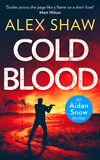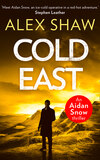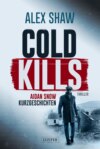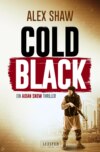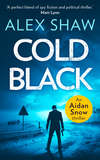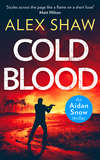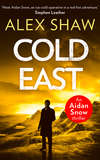Kitabı oku: «An Aidan Snow SAS Thriller», sayfa 3
Bull’s sign was met this time by two short, static bursts. From above and to the right, his men opened fire. A tracer flew towards the descending SOCOL ‘cut off’ group. Four fell without even knowing where their executioners were. The remaining two flung themselves down on the barren hillside and scrambled for the smallest piece of cover. On the road, the intercept team had just enough time to train their weapons. The lieutenant, whose reactions had been surprisingly rapid, managed to get off a single, low-velocity round from his pistol, which struck Driver Two square in his concealed Kevlar breastplate. Staggering back, he had fallen as Drivers One and Three let rip with armour-piercing rounds from short-barrelled AKs, all but cutting the officer in half. Further shots sought out the two attackers on the hill and the engagement was over within a minute. Like the Poznan anti-terrorist police a decade before, the Ukrainian SOCOL had met the Soviet Red Army Spetsnaz and lost. Bull stood, walked down the hill and joined his Brigada. The first part of his business deal had just gone through. He exchanged congratulatory glances with his men and retrieved a satellite phone from a padded pocket.
Tiraspol, Transdniester
Ivan Lesukov sat in the sauna and sweated. ‘You have done well, my friend. And the other half of the bargain? You are a real man of your word, Bull.’ He shut his flip phone and placed it on the wooden plank next to him.
‘They have done it?’ Arkadi Cheban was anxious to know.
Lesukov beamed. ‘Yes, they have. The shipments will no longer be hampered by those Ukrainian “heroes”.’
‘That is great news, Uncle.’ Cheban used the term as a sign of respect. Lesukov was actually the uncle of his wife. He had married into the business, leaving his days of being an interpreter behind.
Lesukov wiped his brow and looked at the younger man. He was ready. ‘We are expanding on all fronts, Arkadi, and I have a job for you.’ He noticed Arkadi’s narrow chest swell with pride. ‘I want you to organise our deliveries in London. Who knows, you may even be able to import chairs.’ He tapped his nose.
Arkadi was ecstatic; he had been dreaming of permanently leaving this joke of a country for as long as he could remember. When he’d been ordered back from England by his uncle, he’d thought perhaps he’d done something wrong and even debated whether to return or not. He had, after all, only been there for three months. On the contrary, however, ‘Uncle’ had been impressed. ‘Thank you, Uncle.’
‘I know how much you will miss Yulia but trust me… she will be able to join you soon.’
In fact, during his time in London, Arkadi hadn’t missed his wife at all. He was quite taken with the Polish girl who worked in the local coffee shop. ‘I do hope so, Uncle; it is lonely without her.’
Lesukov liked this. Having no children of his own, his sister’s daughter was very dear to him and he would have killed anyone who didn’t treat her with respect.
Arkadi changed the subject. ‘Why is Pashinski called “The Bull”?’
Lesukov held up his finger. ‘When we were young conscripts together, about your age, we had a very stupid sergeant who asked Tauras his name. When he replied, the man asked him if he was a bull – like the star chart. I do not know why this offended him but Tauras hit him. You see, the sergeant did not like Lithuanians. Tauras was beaten and left outside in the snow, tied to a post, for three days. A month later the sergeant disappeared on a training exercise. For my part, I think he is more like a venomous snake.’
Chapter 3
Fontanka, Odessa Oblast, Ukraine
The best rooms were, of course, on the thirtieth floor. Here the penthouses had floor-to-ceiling glass walls that gave fantastic views of the landscaped gardens and private beach. The top five floors were VIP class with private clubrooms. Every room in the hotel had both a sea and inland view as the structure curved like a giant wave. The hotel was indeed fantastic, or would be, Varchenko reminded himself, once it was built. Yes. The architect had done a great job of transferring his vision from idea to plans to scale model. Now, it was the foreigners he needed to turn the model into reality, for his wealth alone could not bankroll this venture. A man of the world, he liked to think, since 1991 he had travelled to the best resort and gaming hotels in the world. This hotel would not be Nice’s Hotel Negresco; it would not be Las Vegas’s Caesar’s Palace, New York’s Four Seasons, the Sandy Lane of Barbados, London’s Ritz or Dubai’s Burgh Al Arab. This would be the Hotel Noblesse, and it would be his.
Meetings had been arranged with venture capitalists in London, New York, Zurich and Vienna. He had brought, at his own cost, potential partners to Ukraine. The diving would rival Egypt (they would make a fake reef), the service would be seven-star. This would be the new principality of the twenty-first century and he would be the new prince!
Although he had a tear in his eye and the vodka bottle was empty, he was not a dreamer. Valeriy Varchenko stood, patted the roof of his hotel, and retired for the evening.
Odessa, Southern Ukraine
Sergey Gorodetski threw the grappling hook over the ledge of the warehouse, making sure it was fast before carefully hauling himself up the wall and onto the roof. He paused, counted to a hundred and, when he heard no sounds of alarm or noises from below, worked his way forward on the gravelled roof, all the while making sure to keep his body below the skyline. On reaching the edge of the roof, he leaned against the parapet and removed his rifle from its canvas carry case. He inspected it for dirt before looking down the sight to check for misalignment. Making the necessary adjustment, he carefully chambered the first round. It was two-forty-five and he had exactly five hours to wait for his prey, who was, by his very nature, a creature of habit.
Jas Malik pulled his trench coat around his body and stepped into the back of the Lexus. Ruslan had kept him waiting. Today’s excuse: the local militia refused to let him turn right… or something. Jas didn’t care why he was late, just that he was. Jas did not like this. His father had taught him the value of punctuality at an early age in Islamabad when he’d whipped him for having the audacity to be late for the family stall. Casting Ruslan a stern look, he urged him to ‘bloody hurry up and get him to the factory’.
‘Yes, sir,’ replied the bemused Ukrainian.
‘I have to open the factory at seven-forty-five, no later,’ he ordered, shooting Ruslan a glare before transferring his attention to the heavy lifting cranes of the Odessa docks.
Ruslan slumped over the wheel and made faces in the mirror only he could see. A veteran of Afghanistan, he didn’t suffer fools, such as Jas, gladly, but the fool paid his boss well. Besides, he got to drive this big Lexus and the women loved it.
Seven-twenty. Sergey took up his trigger position on the factory car park. He was invisible to those below unless they made the fatal mistake of staring directly up. Experience and training had taught him patience. What was that English saying his training instructor had told him? Ah, yes: ‘Slowly, slowly, catchy monkey.’ Never before had the saying made so much sense. His eyes started to water and blur his vision. He squeezed them shut and opened them again, blinking, fighting the urge to rub. He would not take his eyes off the trigger position, not now, not after what felt like years of waiting. He would do this now, and he would do it perfectly.
Jas liked the journey to the factory. Speeding past the mainly Soviet-era traffic, made up of Ladas, Volgas, Kamaz trucks and the odd Jigoli, he felt he had really arrived. He allowed himself to smile as he recalled the look he had seen on the faces of the so-called ‘old men’ of the business when he announced his successful bids for hitherto secretive state tenders in Ukraine, Belarus and Russia. Let the corporate Germans in Erlangen call him a tin-pot Paki now!
A car engine approached and Sergey made his final adjustments. The dark-blue Lexus rounded the corner of the warehouse and drew to a halt in front of the main entrance. Sweat formed on his brow despite the unseasonably chilly morning as he concentrated on the crosshairs of the Dragunov’s sight. The door opened and the target started to rise. Let him get out, don’t rush… apply second pressure to the trigger. The single shot flew along the barrel and covered the short distance to the target. There was a crack and suddenly a cloud of blood. The target was propelled backwards, striking the rear panel of the limousine before hitting the ground. The driver momentarily froze before throwing himself to the floor and scrabbling behind the car for cover.
British Embassy, Kyiv, Ukraine
Vickers frowned as Macintosh passed him the report, ashen-faced. ‘It happened this morning Alistair. The driver was unharmed. Mr Malik died instantly. The militia think it was a professional hit.’
Scanning the two A4 sides of Cyrillic print, Vickers’s brow furrowed even deeper than normal. ‘Anyone would think this was sodding Moscow. I don’t suppose the local militia have anything to go on?’
The ambassador shook his head. In his time at the British Embassy he had heard of two other assassinations; both had been foreign investors and both had been unsolved. ‘The first Brit to open a manufacturing plant in Ukraine becomes the first Brit to be murdered in Ukraine. The EU isn’t going to like it one little bit.’ Vickers massaged his temples. ‘I’ll liaise with the SBU. We’ll have to put out a press statement eventually. We don’t want to undo what little commercial progress we’ve made thus far.’
‘And his family?’ the ambassador asked with a concerned voice.
Vickers, still scanning the report, looked up. ‘Oh, yes, we should inform them.’ He read on, suddenly arching his eyebrows. ‘Surprisingly, the body will be on its way back to Kyiv tomorrow. Apparently the SBU don’t trust the local coroner to carry out the postmortem. Once that’s been completed I’ll have consulate arrange passage to the UK.’
Macintosh nodded, looking decidedly pale. Vickers left the ambassador’s office and asked his secretary to send him in a tea. Macintosh was a career diplomat and skilled at cocktail parties, but when the real world encroached on his delicate sensibilities, he really struggled. That’s why I’m here, mused Vickers.
Nearing his own office, he remembered the email in his in tray from the CCCI mission manager in London. Bugger, that was his other hat calling. Alistair Vickers’s official post was that of commercial attaché at the British Embassy, Kyiv. He wore another, albeit invisible hat, however – that of SIS man in Ukraine. Kyiv had been Vickers’s second-choice posting after Moscow.
Sitting back at his own desk, he picked up a custard cream and crunched it between his teeth before sipping his now-cold tea, white Earl Grey with two sugars. A purist would never add milk but he liked it that way. He replaced the cup and saucer on his desk and leant back to concentrate on the report. He had, of course, met Jas on many occasions. The man wasn’t afraid of self-advertising and had managed to get into most of the national newspapers as well as joining expatriate business groups such as the American Chamber of Commerce. In fact, he was probably one of the most well-known ‘Brits’ in Ukraine, which made his murder all the more curious.
Vickers liked to think he knew the feel of the place and he spoke regularly with his contacts in the SBU, the Ukrainian security service. He had been of the opinion that Jas had had a good ‘Krisha’, a ‘roof’ in other words; his local partner had protected him from any unsavoury interest from other businessmen, Mafia. Big business was, to some extent, still governed by the Mafia in Ukraine, and the more noise you made, the more likely it was you would encounter them. Jas’s partner was ideally placed to protect him. The man was a former KGB general and Hero of the Soviet Union who had now amassed a fortune as a businessman. If anyone called the shots, it was this man, General Valeriy Varchenko. As close to an oligarch as you could get in Ukraine, Varchenko had his base in Odessa, Ukraine’s pretty port city. Vickers crunched on another biscuit. Why would anyone pick a fight with Varchenko, for killing his business partner was surely an act of war?
Central Kyiv
‘Da. I’m listening.’
Dudka cleared his throat. ‘Please put me through to Valeriy Ivanovich.’
There was a slight pause. ‘Who would you be?’
‘Tell him it is Genna.’ Dudka drummed his fingers on the plastic café table.
Another pause, noises in the background. ‘OK.’
Dudka heard a rustling at the other end and then a muffled voice started to speak, ‘Gennady Stepanovich, my dear friend, how are you?’
‘Fine, my friend. Is this an inconvenient moment?’
‘No, no,’ Varchenko replied. ‘I am in the middle of a rather good lobster. The next time you are in Odessa you really must try one.’
Dudka eyed his pathetic café sandwich. ‘I have something I need to discuss with you.’
‘Oh, and what might that be?’ Varchenko’s voice was now clear.
Dudka cast his eyes around the terrace; there seemed to be no one eavesdropping. ‘Can we meet at the dacha?’
If any other man had received a call from a Deputy Head of the SBU, the Head of the Main Directorate for Combating Corruption and Organised Crime, they would have been justified in showing concern; however, with Valeriy Varchenko, retired KGB general, what registered sounded more like annoyance. ‘It is not very convenient.’
‘I insist, old friend.’ Dudka held firm; after all, he was still the enlisted man, even though he turned a ‘general’ blind eye to the general in Odessa.
Varchenko sighed, more for effect than anything else. ‘Very well. We’ll meet tomorrow afternoon at three. I’ll even have the chef here prepare you a lobster.’
‘Agreed.’ Dudka put the phone down. He knew where the chef could stick his precious lobster. He bit into his open sausage sandwich. The money and power had clearly gone to his old friend’s head.
Chapter 4
Podilsky School International, Berezniki, Kyiv, Ukraine
Snow rubbed his right thigh, which was playing up again. Was he getting too old for this? He pondered a moment before dismissing the idea. ‘You’re thirty-four, not fifty.’ He surveyed the class as they continued to jog around the small area of grass circling the playground. Some of these kids, especially Yusuf, the Turkish lad, could give him a run for his money. ‘That’s it, two more laps and you’ve finished.’
Would these same kids be so eager to join a running club if they were back home in a normal comprehensive? He thought not. International schools seemed to bring out the best in children. Most would be bilingual by the end of their parents’ three-year stint. Snow blew his whistle and gestured that it was time to go in. Counting heads, he headed back to the school entrance along the small, paved path they shared with the residents of Kyiv’s Berezniki suburb. Yusuf caught up with him and trotted alongside. ‘Did you see how I run, Mr Snow?’ he asked expectantly. ‘I beat Ryoski and Grant.’
Snow nodded and smiled. Yusuf was twelve, quite tall for his age, and wiry. He had the perfect runner’s physique and a real talent.
‘Well done, Yusuf. I’m impressed.’
Yusuf smiled back, picked up his pace and jogged the remaining distance around the corner and into the main entrance. There was a banging; Snow raised his hand to screen the glare of the sun as Michael Jones opened the staffroom window.
‘Hey, Aidan, have you seen this?’ Michael’s west Wales tones lilted to accentuate the question. ‘Murder in Odessa. And to think I was there last weekend!’
Snow took the Kyiv Post and looked at the main page.
‘British investor slain in Odessa factory shooting.’ He scanned the story as Jones kept an eye on the rest of the runners ambling past.
‘What d’ya think?’ Jones’s eyebrows arched in his usual show of curiosity.
Snow studied his friend’s ruddy face. ‘I’m glad I’m just a teacher and no one important.’
Fontanka, Odessa Oblast, Ukraine
The dacha was in the small coastal town of Fontanka, twenty kilometres from Odessa. During Soviet times it had belonged to ‘the Party’ and was for the use of high-ranking members of the YCCP. On Ukrainian independence, this and many other such properties had been sold off by ‘the state’ for hard currency to the highest bidder. The fact that many had been sold to the same person, who was acting as ‘the seller’ on behalf of ‘the state’, had been conveniently overlooked.
This particular dacha had been built in 1979 and used by some of the gold medallists from the 1980 Moscow Olympics. The new owner sought to commemorate this event and had the Olympic rings included in the design of his new nine-feet, wrought-iron security gates which guarded the entrance. The gates weren’t the only part of the dacha to be modernised, ‘remonted’. The original three-storey building remained but an additional wing had been added at a right angle, forming an L shape. Italian marble adorned the surfaces of all the bathrooms, of which there were now six, and the indoor pool. The back of the house led on to a large terrace, with an ornate garden and views of the Black Sea.
Varchenko leant forward to smell a particularly nice rose. He was dressed in an expensive, dark-grey pair of slacks, a black polo shirt and a pair of Italian loafers. A matching dark-grey cashmere sweater was draped casually over his shoulders. He closed his eyes and inhaled deeply. Dudka exhaled and flicked his cigarette stub into the flowerbeds. Varchenko straightened up and frowned at his friend’s disregard for nature’s beauty.
‘What do you know, Genna?’
Dudka met his gaze. ‘I know your British business partner was assassinated in Odessa; I know it was a trained sniper; I know this is not good for general business; but I also know you now control the entire venture.’
‘And you think I am so transparent?’ Varchenko held his gaze.
‘I have to look at all possibilities, Valeriy. You provided a Krisha for the Englishman, yet he is dead.’
‘Yet he is dead…’ Varchenko paused as Dudka fumbled in his jacket pocket for his handkerchief. ‘Go on.’
Dudka blew his nose. ‘Pollen.’ How one could enjoy sniffing flowers, he did not know. He wiped his nose and returned the handkerchief to his crumpled suit pocket. ‘That is all I can say on the matter. This partner of yours was a very high-profile businessman, liaised with his embassy, spoke at business lunches and drew much attention.’
Varchenko snorted. ‘This is a difficult situation for me, Genna, old friend, as I am sure you are aware. I gave this man my word it would be safe to invest here, to work here, to live here. He had my word, you understand, my word on this. My best men guarded him; he was in no danger from normal “business threats”. This murder places much stress on the status quo, on the relationship and understanding we share, Genna.’ Varchenko looked him in the eye.
Dudka grunted, ‘And you think I am not immune to this? Remember, I’m the one who has turned a “blind eye” to your business dealings here.’
‘And for this you are handsomely rewarded.’ Varchenko paused. ‘Ah, my old colleague, so we are both in the same situation. What is bad for me is bad for you. But the agreement works. What crime we have here is now under control – ask any one of your SBU underlings to give you a report. I have worked hard to ensure this, but then, when I am on the verge of a successful endeavour, it is potentially snatched away. By whom? That is what I must know. Who is it who dares upset us?’
Dudka shrugged. ‘You have no idea? I have seen some intelligence about the Turks and I have also read reports on the Moldavians.’
Varchenko closed his eyes to hide his rage. ‘Turks! I am aware of the Turks and they would not dare attempt this! And the Moldavians could not spell the word assassinate! No, this must be someone new.’
So his old superior was worried. ‘That, I am afraid, is all we have at the moment. We will, of course, be exploring all possibilities, Valeriy.’
Varchenko raised his finger. ‘All possibilities? We are both decent men, Genna. We did not work all these years together to protect the people’s interest to now be threatened in our golden years! We have kept it simple. Old-fashioned crime. None of the slavery, narcotica or weaponry…’
Varchenko’s voice trailed off and Dudka nodded. It was true. Varchenko was a bandit, but an honest one. There was crime in Odessa but, because of him, it was petty; the large-scale arms smuggling, people and drug trafficking of the early Nineties had been severely restricted. Dudka felt his stomach rumble. ‘Where is that lobster you promised me?’
Shoreham by Sea, United Kingdom
The morning sky was a brilliant blue, unusually so for this time of year, but Bav didn’t notice as he headed towards Lancing. Under the supervision of his father he had been, on paper, managing director of UK operations while his cousin held the same title in Islamabad. Jas had held the position of chairman with overall responsibility for NewSound worldwide. Now, with his death, Bav, at the age of thirty-seven, had been left the lot. His own dispensing business would have to cease as he took the reins of the three plants. He had never wanted to go into the family business. His only concession, albeit a large one, was to train as an audiologist. He had then, of course, been ‘persuaded’ to recommend his family’s products. And now he could hardly refuse his appointment as MD.
His old man was – had been, he corrected himself – a crafty one. All the while he had known deep down that Bav, and Bav alone, would replace him. That he, and not his cousin, Said Shabaz, would be the future head of NewSound.
He bit his bottom lip to stop the tears forming again. He could not stay at home and grieve; he had to carry on, open the factory – it was what his father would have wanted. Why did you have to die, Dad, why did you have to leave me? An old man who had only ever brought happiness had been snatched away by a bullet. It wasn’t working. He’d have to stop. The factory would have to open later. He pulled onto the hard shoulder, stabbing the hazard-warning button with his left index finger as tears fell from his eyes.
British Embassy, Kyiv
Simon Macintosh extended his hand. ‘Thank you for coming to see us, Director Dudka.’
Dudka took the proffered hand and shook it with a firm grip. ‘It is least we can do, Mr Ambassador.’
Macintosh nodded and introduced the man standing at his side. ‘This is Alistair Vickers. He will be liaising with London.’
Vickers and Dudka shook hands.
‘And this is Vitaly Blazhevich. He is running investigation.’
Blazhevich shook hands with both British diplomats. The ambassador bade them sit.
‘My English not as good as could be. I am sorry. I speak Deutsch.’
Dudka put his hand on Blazhevich’s shoulder. ‘But Vitaly is secret weapon.’
There was a knock at the door and Macintosh’s secretary brought in a tray containing four cups of tea, a bowl of sugar, milk and custard cream biscuits. Dudka took a cup, nodded, blew on the surface of the tea, then took a sip. Momentarily his eyes flickered before he placed the cup on the table. ‘Dobre Smak.’ It was a lie. The tea tasted peculiar.
‘Earl Grey. Traditionally English.’ Vickers poured milk into his own cup.
Blazhevich opened a file and placed it on the table. Dudka spoke in Ukrainian and Blazhevich translated into English. ‘We are obviously very sorry for the loss of Mr Malik. We want to confirm that we will give our full support and resources to finding the person or persons responsible for this unlawful act.’
Blazhevich looked at Dudka. Dudka added two spoons of sugar to his tea and sipped. Vickers made notes on a PDA with a plastic pointer while Macintosh knotted his hands in his lap and nodded. The biscuits remained untouched. Dudka continued, with Blazhevich a phrase behind.
‘Here are photographs taken at the scene. They are not appealing. The angle of the impacted bullet leads us to believe the shot came from above. Scuff marks on the roof of a neighbouring warehouse substantiate this.’
Macintosh, his face pale, passed the photographs to Vickers, who spoke next. ‘What type of ammunition?’ Vickers studied the image. ‘7.62?’
‘Tak.’ Dudka smiled and continued in English. ‘Very common in former USSR.’
Vickers studied the image again. ‘May we presume it was a trained sniper?’
‘Tak. Our Red Army had many, many.’
Blazhevich added more information: ‘As you have hinted, the profile of the suspect we have is a trained sniper. This further adds to our suspicion that the attack was professional and pre-planned.’
Macintosh placed his palms on the table. ‘So we have a British citizen assassinated by a paid assassin, a sniper. Do you have any idea who the paymaster might have been?’
Vickers tried not to smile. For all Macintosh’s professional abilities, investigating a murder was not one of them. He tried his best but sounded to Vickers like a le Carré novel.
‘This is something we intend to investigate further,’ Blazhevich translated. ‘Can we ask you for any ideas you may have? For example, a list of Mr Malik’s business and social contacts?’
‘Alistair?’ Macintosh looked at Vickers.
‘We have searched all our files and of course asked the expatriate community; however, at this stage, we have nothing of any consequence.’
Vickers waited while his words were translated. ‘We, of course, know that Mr Malik was in partnership with a Ukrainian joint stock company and believe they would be the only party to gain from this.’
Dudka’s eyes narrowed for a moment before he spoke. Blazhevich looked at Macintosh then Vickers in turn. ‘We can assure you that we have started to interview all directors of Odessa-Invest in addition to a number of others. We will find those responsible.’
There was a pause as the four men pondered their positions. ‘Well, gentlemen. I feel reassured that the SBU are actively working on this disturbing and unfortunate case, and that Director Dudka himself has taken a personal interest. I like Ukraine and like working here. Your country has made much progress towards becoming an investment and business power in the last few years, and the British Government will do all it can to assist in the continuation of this.’ He stood and shook Dudka’s hand again.
Vickers showed the two men from the SBU out into the hall. A minute later, after bidding them goodbye and thanking them again, he re-entered the room to find Macintosh with the plate of biscuits in his hand.
‘Nice chaps; not like the old KGB. I feel they will do all they can.’
‘I’m sure.’ But Vickers was not.
Lingfield, Surrey, UK
A low burble crept into Arnaud’s head. At first it mixed with the last-orders bell in the pub, until he realised it was a shrill electronic note and not the brass ding he’d expected. The busty barmaid who had been ‘chatting him up’ abruptly vanished.
‘Oh, no!’ Arnaud leapt from his bed and ran downstairs to the hall.
Now well into September; and still no permanent job. Arnaud had signed with a supply-teaching agency covering the Surrey and Sussex area. Sometimes he would get a call in the evening asking him if he wanted a day’s work the next day, but mostly they would call in the morning, getting him out of bed and in general giving him a matter of minutes to get to the station and on his way. He had started a routine. Regardless of a call or not, each night he would iron a shirt, make a packed lunch and ready his ‘schoolbag’. His mother was always offering to help, but since he had returned from university and was now living at home again, he felt somehow embarrassed he didn’t contribute enough around the house. The fact that the agency would insist on calling the house phone downstairs rather than his mobile was also irksome. His father had complained on more than one occasion.
‘Hello… hello… hello,’ he said to himself as he reached for the phone in an attempt to get rid of his ‘morning voice’.
‘Hello?’ There was a strange tone on the line. After a pause a voice finally answered.
‘Hello. Is that Arnaud Hurst?’
‘Yes, it is.’
‘Hello, Arnaud. This is Joan Greenhill from Podilsky School. How are you?’
Arnaud tried to think who this woman calling him at ten past six in the morning might be; then he suddenly realised. Podilsky School, the international teaching job he had applied for. ‘I’m fine, thanks,’ he replied, slightly lost for words but no more awake.
‘Good, good. Arnaud, I wanted to make sure I got you before you left for work… Oh, I’m terribly sorry, I’ve just remembered the time difference. We’re two hours ahead of you. Oh, dear…’
Arnaud decided to be British and reduce her embarrassment. ‘Not to worry. I usually get up at six-ish to go for a run so I was already awake.’
The voice on the phone replied, ‘Oh, that’s good.’ It then took on a more professional tone. ‘I’m sorry we didn’t get back to you sooner. I expect you thought we’d forgotten about you?’
‘Well, I did think the job must have gone to someone else.’ It had been May when he’d originally seen the advert in the TES overseas appointments section, and June when he’d met with the American interviewer in London.
‘Well, as a private school, we did have some staffing issues here, which meant we were unable to appoint over the summer, but I won’t bother you with the details. Arnaud, the reason I’m calling is that I have some good news for you. Your application for the position of teacher of French and English has been successful.’
